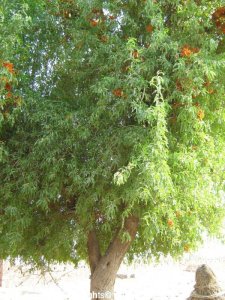From Wikipedia, the free encyclopedia
Tecomella undulata is
tree species, locally known as
Rohida, found in
Thar Desert regions of northwest and western
India. It is a medium sized
tree that produces quality
timber and is the main source of timber amongst the indigenous tree species of desert regions of
Shekhawati and
Marwar in
Rajasthan. The trade name of the tree species is
Desert teak or
Marwar teak.
Tecomella undulata is a
deciduous or nearly
evergreen tree of arid and semi arid regions. It occurs on flat and undulating areas including gentle hill slopes and sometimes also in ravines. It is well adapted to drained loamy to sandy loam soil having
pH 6.5-8.0. The species thrives very well on stabilized sand dunes, which experience extreme low and high temperatures. It grows in areas of scanty rainfall (annual 150-500mm) and high temperature (35 °C to 48 °C). It can withstand extreme low temperature (0 °C to −2 °C) during winter and high temperature (48 °C to 50 °C) in summers. The tree is a strong light demander. It is drought, frost, fire and wind hardy. At the time of flowering (December-February) it produces beautiful showy flowers in yellow, orange and red colours. Three types of flower bearing trees can be observed near to each other in the same vicinity.
Distribution
Tecomella undulata is an accepted tree species in agro
forestry and large population is found in
agriculturallands. It can be observed growing in
community land, forestland and orans in association with
Prosopis cineraria,
Capparis decidua,
Maytenus emarginata,
Zizyphus spp. And
Salvadora spp. In agriculture land it generally grows in association with
Prosopis cineraria.
Uses
Tecomella undulata is mainly used as a source of timber. Its wood is strong, tough and durable. It takes a fine finish. Heartwood contains quinoid. The wood is excellent for firewood and charcoal. Cattle and goats eat leaves of the tree. Camels, goats and sheep consume flowers and pods.
Tecomella undulata plays an important role in
ecology. It acts as a soil-binding tree by spreading a network of lateral roots on the top surface of the soil. It acts as a windbreak and helps in stabilizing shifting
sand dunes. It is considered as the home of birds and provides shelter for other
desertwildlife. Shade of
tree crown is shelter for the cattle, goats and sheep during summer days.
Tecomella undulata has got medicinal properties as well. The bark obtained from the stem is used as a remedy for
syphilis. It is also used in curing
urinary disorders, enlargement of
spleen,
gonorrhoea, leucoderma and
liver diseases. Seeds are used against
abscess.
(Tecomella undulata औषधीय गुणों के रूप में अच्छी तरह से मिला है. स्टेम से प्राप्त छाल उपदंश के लिए एक उपाय के रूप में प्रयोग किया जाता है. यह भी मूत्र विकार के इलाज मेंप्रयोग किया जाता है, प्लीहा की वृद्धि, सूजाक, श्वित्र और यकृत रोग. बीज फोड़ा के खिलाफ उपयोग किया जाता है.)
References
--------------------------
Posted on March 8th, 2011 by Nirupama
Roheda is the state flower of
Rajasthan. It is a treat to the eyes when you come across a Roheda in full bloom in the desert. The common name of Roheda is Honey Tree, Desert Teak and Marwar Teak. In Sanskrit it is known as Chalachhada and the botanical name is Tecomella undulata belonging to the family Bignoniaceae.
Plant Summary:
Roheda is a hard deciduous tree and grows in dry regions. The tree plays a very important role in the desert region as it helps to bind the soil by the spread of its roots. The tree flourishes in extreme weather. It is found in areas where there is very less water, more sunlight and sandy soil. The wood of this tree is used for firewood, and the leaves as fodder for cattle and goats. The flowers and pods are relished by Camel, goats and sheep.
The birds in the desert nest on this tree and other desert wildlife rest under this tree.
Roheda is indigenous to Gujarat, Maharashtra, Punjab, Haryana and Thar Desert of Rajasthan.
Leaves are 5-12 cm long and narrow with wavy edges. The tubular flowers are beautiful in yellow, orange and red colors.
Fruit is a to 20 cm long, thin, curved capsule with winged seeds. The flowering season is from December to February.
Medicinal uses:
The parts of Roheda tree is used to cure many ailments like syphilis, urinary disorders, enlargement of spleen, abscess, Hepatitis, gonorrhoea, leucoderma and liver diseases.
From : http://www.itslife.in/gardening/trees/roheda#more-11331












0 जानकारी अच्छी लगे तो कृपया एक कमेंट अवश्य करें।:
Post a Comment